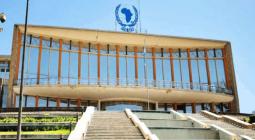Climate activists are enraged that African leaders want to invest in fossil fuels
When the EU voted last month to classify natural gas as ‘green energy,’ it opened a window that Africa has been waiting for: access to low-cost funds to run energy projects that do not rely on solar, wind nor geothermal.
During a press call at the US-Africa summit in Morocco last month, Adesina Akinwumi, the president of the African Development Bank said that “no part of the world ever developed using renewable energy alone. Gas is a fundamental energy source in Africa.” Nearly 300,000 women die every year by inhaling smoke and fumes from cooking-stove firewood, he added.
A technical paper published by the African Union (AU) shows that Africa is preparing for the use of both renewable and non-renewable energy sources, as part of its AU Agenda 2063. “In the short- to medium-term, fossil fuels, especially natural gas, will have to play a crucial role in expanding modern energy access,” the paper reads.
Africa is committing to oil and gas
This planned move is enraging climate activists, who say Africa is now in danger of locking itself into fossil fuels for the foreseeable future, despite having the highest solar energy potential among all continents.
The AU paper, the activists argue, lays the groundwork for the COP27 climate talks in Cairo this November, where countries will lobby to label natural gas production green, as Egypt looks to boost exports to a gas-starved Europe.
“It’s ironic that the continent with the highest renewable energy potential and [the one] hit hardest by the impacts of the climate crisis is the one willing to go down the dirty, risky fossil fuel path,” Mohamed Adow, the director of Nairobi-based climate think tank Power Shift Africa, told Quartz.
This compromise is not worth making for the perceived short-term gains of gas, Adow said. Instead, Africa should put the needs of its people first by developing clean and decentralized energy systems for domestic use. said. “Going the gas way is too high a price to pay, as it will leave us in debt and the pollution will affect our people’s health,” he said.
Africa’s gas projects have Europe in mind
Lorraine Chiponda, the coordinator of Africa Coal Network, which works to end the use of coal in Africa, criticized the move towards natural gas as profit-seeking. It is, she said, “not directed by Africa’s needs but by the energy crisis from Europe.” In the wake of the Ukraine war, the EU has committed to sourcing natural gas from countries other than Europe, offering other gas producers a sudden new source of revenue.
Fatima Ahouli, the regional coordinator of Climate Action Network Arab World, described the world’s drive to mine African fossil fuels as a new form of exploitation. “The continuous and unsustainable abuse of Africa’s resources contradicts all the fight against climate change,” she said. “We...demand a shutdown of these colonialist mindsets that only lead to more conflicts and accelerate humanity’s doomsday.”
Climate change is already killing Africans
According to World Health Organization, climate change will claim the lives of 250,000 more Africans per year between 2030 and 2050. Climate-related events already appear to have begun to take their toll. On Aug. 3, at least 24 Ugandans lost their lives as flash floods hit the town of Mbale, leaving 5,600 displaced and 400,000 without clean water. Over 5,000 acres of crops were destroyed.
A 2019 Save the Children report shows over 1,200 people died as the result of cyclones, floods, and landslides in Mozambique, Somalia, Kenya, Sudan, and Malawi. Southern Africa is warming at twice the global rate, and at least 33 million people were at emergency levels of food insecurity.
The UN reported that by 2030, up to 118 million extremely poor people on the continent will be exposed to drought, floods, and extreme heat. Investment in climate adaptation for sub-Saharan Africa will cost between $30 to $50 billion each year over the next decade. As at 2021, 5 million deaths were linked to climate change globally.
Faustine Ngila | https://qz.com/



